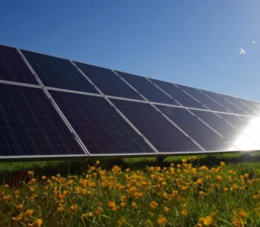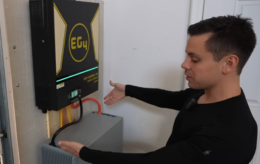Empowering Off-Grid Homesteads: Harnessing Solar Energy with Battery Backup

Introduction: In the realm of off-grid living, self-sufficiency and sustainability are guiding principles. The quest for alternative energy sources has led many homesteaders to embrace solar energy with battery backup as a game-changing solution. In this blog post, we’ll delve into the benefits, components, and considerations of adopting solar energy with battery backup for off-grid homesteads, shedding light on a brighter and more self-reliant future.
The Power of Solar Energy: Harnessing the sun’s abundant energy is a cornerstone of off-grid living. Solar panels convert sunlight into electricity through photovoltaic cells, a process that releases no emissions and generates power in a renewable, eco-friendly manner. Here’s why solar energy is an excellent choice for off-grid homesteads:
1. Energy Independence: Off-grid homesteaders often seek freedom from utility companies. Solar energy provides a self-reliant energy source that isn’t subject to grid outages or rising energy costs.
2. Environmental Benefits: Solar power significantly reduces carbon footprint, contributing to a cleaner environment and mitigating the effects of climate change.

3. Low Maintenance: Solar panels require minimal maintenance. Regular cleaning and occasional checks ensure optimal performance.
4. Longevity and Reliability: Quality solar panels can last for decades, making them a reliable long-term investment.
Battery Backup: The Key to Uninterrupted Power: While solar panels generate energy during daylight hours, battery backup systems store excess energy for use during the night or cloudy days. This ensures a constant power supply. Key advantages of battery backup include:
1. Energy Storage: Batteries store surplus energy, allowing you to use it when needed, even after the sun sets.
2. Off-Peak Usage: Stored energy can be used during peak demand times or when grid power is expensive.
3. Emergency Preparedness: Battery backup provides a reliable power source during grid outages, enhancing your homestead’s resilience.
Considerations for Implementation: As you embark on your solar energy journey, consider the following factors:
1. Energy Needs: Evaluate your homestead’s energy consumption to determine the size of the solar array and battery bank needed.
2. Location and Sun Exposure: The efficiency of your solar system depends on your location and the amount of sunlight your panels receive.
3. System Design: Work with professionals to design a system that meets your energy requirements and homestead’s layout.
4. Budget: Initial investment costs include solar panels, inverters, batteries, and installation. However, long-term savings often outweigh the upfront expenses.Conclusion: A Radiant Future: Embracing solar energy with battery backup offers off-grid homesteaders a path to self-reliance, sustainability, and a brighter future. With the power of the sun harnessed at your fingertips, you’ll be able to illuminate your homestead while minimizing environmental impact. By investing in solar energy, you’re not only generating electricity – you’re cultivating a legacy of conscious living and energy independence that can inspire generations to come.
Author: Mike Kru
